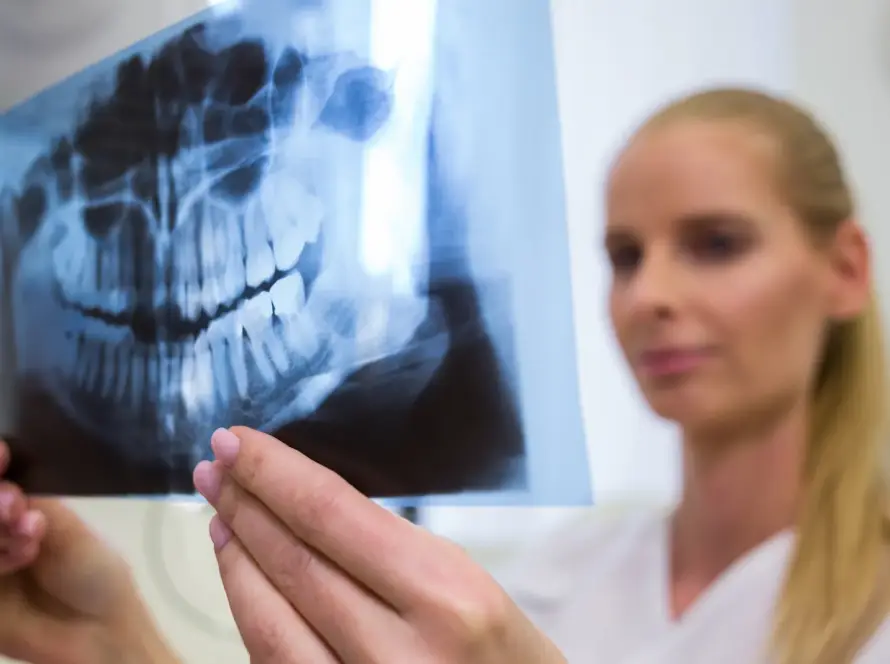Dental veneers are thin, custom-made shells designed to cover the front surface of teeth to enhance their appearance. They are commonly used to correct various dental issues such as discoloration, chips, gaps, and minor misalignments. These veneers are typically created from porcelain or composite resin material, each offering unique benefits that contribute to a natural looking, aesthetically pleasing smile.
Types of Dental Veneers
- Porcelain Veneers:
- Durable and long lasting
- Resistant to stains
- Offers a natural looking appearance
- Requires minimal removal of the tooth’s enamel
- Composite Resin Veneers:
- Less expensive compared to porcelain veneers
- Can be applied in a single visit
- Easier to repair if damaged
- May not last as long as porcelain veneers
Indications for Veneers
- Discolored Teeth: Ideal for teeth that are severely stained and do not respond well to whitening treatments.
- Worn Down Teeth: Can cover up teeth that are worn down due to grinding or other factors.
- Chipped or Broken Teeth: Offers an excellent solution to cover up chipped or broken teeth, restoring their normal appearance.
- Misaligned or Uneven Teeth: Useful for adjusting the alignment and appearance of teeth with minor misalignments.
- Gaps Between Teeth: Fills space to provide a more uniform appearance.
Procedure Overview
- Consultation: The dentist evaluates the patient’s oral health, discusses desired outcomes, and explains the options.
- Preparation: The dentist removes a small amount of enamel from the tooth surface to make room for the veneer.
- Impression: An impression of the teeth is taken to create custom veneers that fit perfectly.
- Bonding: The veneers are bonded to the teeth using a strong adhesive, then shaped and polished for a natural look.
Benefits of Dental Veneers
- Enhances smile aesthetics
- Provides a natural tooth appearance
- Offers a durable solution
- Requires minimal enamel removal
- Resistant to stains from coffee, tea, and smoking
Designed to be both functional and cosmetic, dental veneers can significantly improve a patient’s smile and overall dental health.
Why Choose Turkey for Dental Veneers?
Turkey is rapidly gaining recognition as a leading destination for dental veneers, blending high quality treatment with affordability and convenience. Several factors contribute to this growing reputation:
Advanced Technology and Expertise
Turkish dental clinics are equipped with state of the art technology, allowing dentists to offer extremely precise and effective veneer treatments. The following points highlight their competitive edge:
- Cutting Edge Equipment: Clinics commonly feature advanced imaging systems, CAD/CAM technology, and laser tools.
- Highly Trained Dentists: Dentists in Turkey often receive education and training from globally recognized institutions. Many have specialized expertise and experience in cosmetic dentistry.
- Continuous Professional Development: Regular participation in international conferences and workshops keeps Turkish dentists updated on the latest advancements in dental veneer techniques.
Cost Effective Treatments
One of the primary reasons patients choose Turkey for veneers is the affordability without compromising on quality.
- Competitive Pricing: The cost of dental veneers in Turkey is significantly lower than in many Western countries, primarily due to the lower cost of living and the favorable exchange rates.
- Package Deals: Many clinics offer comprehensive packages that include consultations, treatment, accommodation, and even tourist activities, providing excellent value for money.
High Quality Materials
The materials used for dental veneers in Turkey are sourced from reputable global suppliers, ensuring durability and aesthetics.
- Premium Quality Veneers: Options include porcelain, composite, and Lumineers, catering to different aesthetic preferences and budgetary considerations.
- Customization: Each veneer is custom-made to match the patient’s natural teeth, enhancing both functionality and appearance.
Exceptional Patient Care
Patient satisfaction is a top priority in Turkish dental clinics. This focus is reflected in several aspects:
- Personalized Treatment Plans: Dentists dedicate time to assess each patient’s needs and create a tailored treatment plan.
- Comprehensive Care: Patients receive detailed pre-treatment consultations and thorough post-operative care to ensure optimal results and recovery.
- Multilingual Support: Many clinics offer services in multiple languages, making it easier for international patients to communicate their needs and concerns.
Convenient Travel and Tourism
Turkey’s strategic location and rich cultural heritage make it an appealing choice for dental tourism.
- Accessible Destination: With numerous direct flights from major cities worldwide, traveling to Turkey is convenient.
- Tourism Opportunities: Patients can combine their dental treatment with a vacation, exploring Turkey’s historic sites, beautiful landscapes, and vibrant cities.
These factors collectively make Turkey an attractive option for individuals seeking high-quality, affordable dental veneers.
Types of Dental Veneers Available in Turkey
Turkish dentists offer a diverse range of dental veneers tailored to suit various aesthetic needs and budget considerations. These veneers are designed to enhance the appearance of teeth by covering flaws such as discoloration, chips, or gaps. The types of dental veneers available in Turkey include:
Porcelain Veneers
Porcelain veneers are among the most popular choices for dental transformations. Known for their durability and natural appearance, these veneers are crafted from high-quality ceramic materials. The advantages of porcelain veneers are:
- Long-lasting with proper care, typically lasting 10-15 years.
- Stain-resistant, maintaining their appearance over time.
- Customizable to match the natural color and shape of teeth.
Composite Resin Veneers
Composite resin veneers provide an economical option without compromising on aesthetics. These veneers are made from a composite material that can be molded directly onto the teeth. Their benefits are:
- Cost effective compared to porcelain veneers.
- Quicker application process, often completed in a single visit.
- Easier to repair if damaged.
Lumineers
Lumineers are a subtype of porcelain veneers but are much thinner. This type of veneer is renowned for requiring minimal to no tooth reduction prior to application. Features of Lumineers include:
- Minimal invasiveness due to the lack of extensive tooth preparation.
- Quick procedure, often requiring fewer visits.
- Durable and long-lasting similar to traditional porcelain veneers.
Zirconia Veneers
Zirconia veneers are crafted from zirconium dioxide, known for its incredible strength and aesthetic qualities. These veneers are ideal for those seeking a robust solution. Their characteristics are:
- Highly durable, making them suitable for patients with severe dental issues.
- Excellent biocompatibility reducing the risk of allergic reactions.
- Offers a natural look with high translucency and brightness.
Palatal Veneers
Palatal veneers, also known as palatal onlays, cater to the restoration of the inner surfaces of the teeth. They are typically used for repairing wear on the back surfaces of front teeth. They provide:
- Effective protection against further enamel wear.
- Restored function and aesthetic appearance of the teeth.
- Custom-fabricated to provide a precise fit.
Removable Veneers
Removable veneers are non-permanent and can be taken off as desired. These are often used for temporary cosmetic improvements. Their key advantages include:
- Immediate transformation without permanent alteration to the teeth.
- Affordable and convenient for special occasions.
- Custom-fitted for comfort and appearance.
E-max Veneers
E-max veneers are another excellent choice, renowned for their superior aesthetics and strength. Made from lithium disilicate ceramic, they are:
- Highly durable, ideal for extensive restorations.
- Natural-looking, providing an exceptional match to existing teeth.
- Resistant to chipping or breaking, even in thin layers.
In Turkey, patients have access to a wide array of dental veneers, each offering distinct benefits tailored to individual needs.
The Process of Getting Dental Veneers
The process of obtaining dental veneers in Turkey is meticulous and involves several steps to ensure optimal results and patient satisfaction. Patients go through a series of consultations, fittings, and procedures guided by experienced Turkish dentists.
Initial Consultation
- Assessment: The dentist conducts a comprehensive oral examination, including X-rays and possibly dental impressions, to evaluate the patient’s dental health.
- Discussion: The patient’s goals and expectations are discussed to tailor a suitable treatment plan. The dentist explains the different types of veneers available, such as porcelain and composite, along with their benefits and drawbacks.
- Quotation: Financial aspects, including the cost of veneers and payment options, are reviewed to ensure the patient is well-informed.
Preparation
- Teeth Preparation: A small amount of enamel is removed from the front surface of the teeth. This step is crucial to ensure a natural fit for the veneers.
- Impressions: Detailed impressions of the prepared teeth are taken to create custom veneers. Temporary veneers may be placed to protect the teeth while the final veneers are being made.
Fabrication
- Crafting: The impressions are sent to a dental lab where skilled technicians craft the veneers to match the desired shape, size, and color based on the dentist’s specifications.
- Customization: The veneers are tailored to achieve a harmonious balance with the patient’s natural teeth, taking into account factors such as translucency and texture.
Placement
- Fitting: The dentist places the veneers on the teeth using temporary adhesive to check the fit and appearance. Adjustments are made if necessary.
- Bonding: Once the fit is confirmed, the veneers are permanently bonded to the teeth using a strong dental adhesive. A curing light is used to harden the adhesive quickly.
- Finishing Touches: Final adjustments are made to refine the fit and ensure a comfortable bite. The dentist polishes the veneers to achieve a natural and aesthetically pleasing finish.
Post-Procedure Care
- Instructions: Patients receive detailed aftercare instructions to maintain the veneers and overall dental health.
- Follow-Up: A follow-up appointment is scheduled to monitor the veneers, check for any issues, and ensure the longevity of the treatment.
This entire process might span over two or three visits to the dentist, depending on the specific requirements and complexities of each case.
Finding the Right Dentist in Turkey
Choosing the right dentist is crucial for a successful dental veneers procedure. When considering a dentist in Turkey, several factors should be evaluated. Here are key points to keep in mind:
- Credentials and Qualifications:
- Verify if the dentist is certified and holds qualifications from reputable institutions.
- Check for additional training or specialization in cosmetic dentistry, particularly in dental veneers.
- Experience and Expertise:
- Determine the number of years the dentist has been practicing, especially in cosmetic procedures.
- Look for a portfolio of before-and-after photos of previous veneer patients.
- Inquire about the number of veneer procedures performed annually.
- Technology and Techniques:
- Ensure the clinic is equipped with modern dental technology like digital X-rays, intraoral cameras, and CAD/CAM systems for precision.
- Ask whether the dentist uses the latest techniques and materials for veneers.
- Patient Reviews and Testimonials:
- Research online reviews on platforms such as Google, Facebook, and dental forums to gauge patient satisfaction.
- Seek testimonials from past patients and, if possible, contact them for firsthand accounts of their experiences.
- Initial Consultation:
- Schedule a consultation to discuss goals, concerns, and expectations.
- Assess how thoroughly the dentist examines the oral health condition and proposes a treatment plan.
- Observe the level of communication and if the dentist is attentive to patient queries.
- Costs and Payment Plans:
- Compare the pricing structures of different clinics to ensure the cost of veneers fits within the budget.
- Ask about financing options or payment plans available to ease the financial burden.
- Travel and Accommodation Assistance:
- Look for clinics that offer assistance with travel arrangements, including airport transfers and accommodation.
- Ensure the clinic provides a comprehensive guide and support throughout the stay.
Finding the right dentist in Turkey requires thorough research and careful consideration of various elements. Being diligent about these factors can lead to a satisfactory and successful dental veneer experience.
Cost of Dental Veneers in Turkey Compared to Other Countries
The cost of dental veneers in Turkey offers a significant financial advantage for international patients. Turkish dental clinics combine high-quality services with affordable pricing, making it an attractive destination for those seeking dental cosmetic treatments.
Several elements contribute to the lower prices in Turkey:
- Economic Factors: The lower cost of living and favorable exchange rates play a crucial role in reducing overall expenses, including medical and dental services.
- Government Policies: The Turkish government supports medical tourism through various incentives and investment in healthcare infrastructure.
- Skilled Workforce: An abundance of qualified dental professionals helps keep labor costs competitive without sacrificing quality.
Comparing the prices of dental veneers in Turkey with other countries can provide a clearer picture:
- Turkey: The cost for a single veneer ranges from $150 to $300.
- United States: In the U.S., the price for a single veneer can be between $800 and $2,500, depending on the region and the dentist’s expertise.
- United Kingdom: Patients in the UK may expect to pay between £300 and £1,000 (approximately $400 to $1,300) per veneer.
- Australia: The cost in Australia parallels the U.S., with prices ranging from AUD $900 to $2,500 (approximately $700 to $1,800) per veneer.
- Germany and Switzerland: These countries offer veneers at prices ranging from €600 to €1,500 (approximately $650 to $1,600).
- Quality and Standards: Turkish dental clinics often meet and sometimes exceed international standards. Many Turkish dentists receive training from accredited institutions in Europe and the U.S., ensuring a high level of expertise and patient care.
For patients considering dental veneers, cost is an important factor alongside quality and reliability. Turkey’s affordable options make it a compelling choice globally.
Pre Procedure Preparation and Consultation
Before undergoing the dental veneer procedure in Turkey, patients need to engage in thorough preparation and consultation. This stage ensures that both the patient and the dentist are aligned on the expectations, outcomes, and necessary steps.
Initial Consultation
- Assessment of Dental Health: The dentist will conduct a comprehensive examination of the patient’s oral health. This includes checking for any signs of decay, gum disease, and assessing the overall structure of the teeth.
- X-rays and Impressions: Often, X-rays and impressions of the teeth are taken. These help in creating a precise mold and plan for the veneers.
- Discussion of Goals: Open communication about what the patient wishes to achieve with veneers is essential. This might include the color, shape, and size of the veneers.
Health and Medical History
- Medical History Review: The patient will need to provide a complete medical history, including any medications and previous dental procedures.
- Discuss Allergies: Any allergies, particularly to anesthesia or specific dental materials, must be disclosed.
Planning and Customization
- Choosing the Right Veneer Material: The dentist will discuss different material options such as porcelain or composite resin, highlighting the benefits and potential drawbacks of each.
- Mock-Up and Visualization: Some clinics offer digital mock-ups or physical prototypes to help patients visualize the potential results.
Pre Procedure Instructions
- Diet and Medication Guidance: Patients might receive specific instructions on eating and medication intake prior to the procedure.
- Lifestyle Adjustments: Avoiding smoking and reducing caffeine intake are often recommended to ensure optimal outcomes.
- Scheduling and Timing: Ensuring that the patient’s schedule allows for necessary recovery time post-procedure is crucial.
Financial Discussions
- Cost Estimation: A clear outline of the procedure’s cost, including any additional charges, should be provided.
- Payment Plans: Many clinics offer flexible payment options, which need to be discussed and arranged beforehand.
Psychological Preparation
- Expectation Management: Setting realistic expectations regarding the procedure and outcomes will help in achieving satisfaction.
- Addressing Anxiety: For patients who experience dental anxiety, discussing sedation options and coping strategies can be beneficial.
Thorough preparation and consultation are critical components of the veneer process in Turkey, ensuring a smooth and successful outcome.
Day of the Procedure: What to Expect
On the day of the procedure, patients should arrive at the clinic at the scheduled time. The process begins with a final consultation where the dentist reviews the treatment plan and addresses any last-minute concerns.
Pre Procedure Steps
- Initial Examination: The dentist will conduct a thorough oral examination to ensure the teeth and gums are healthy.
- Hygiene Preparation: Teeth cleaning is usually performed to remove any plaque or tartar.
- Anesthesia: Local anesthesia may be administered to ensure the patient remains comfortable throughout the procedure.
The Preparation
The preparation phase involves:
- Shaping the Teeth: A small amount of enamel may be removed from the front and sides of the teeth to make space for the veneers.
- Taking Impressions: Impressions or molds of the teeth are taken to create custom veneers that fit perfectly.
- Temporary Veneers: Temporary veneers might be applied while the custom veneers are being made.
Placing the Veneers
Once the custom veneers are ready:
- Fitting and Adjusting: The dentist will place the veneers on the teeth to check the fit and color, making adjustments as needed.
- Bonding: A special cement is used to bond the veneer to the tooth. A curing light is used to harden the cement quickly.
- Final Adjustments: Any necessary bite adjustments are made, and the veneers are polished to give a natural look.
Post-Procedure Care
- Initial Sensitivity: It is normal to experience some sensitivity to hot and cold after the procedure, which should subside within a few days.
- Aftercare Instructions: Patients will receive detailed aftercare instructions, including recommended oral hygiene practices and foods to avoid.
- Follow-up Appointment: A follow-up appointment may be scheduled to ensure the veneers are properly set and there are no complications.
Patient Comfort and Care
Turkish dental clinics typically prioritize patient comfort. They may offer amenities such as:
- Comfortable Waiting Areas: Equipped with beverages and reading materials.
- Staff Assistance: Staff available to assist with any needs throughout the visit.
- Translation Services: For international patients to facilitate communication.
Overall, the day’s experience is designed to be efficient and comfortable, ensuring the highest standard of care.
Post-Procedure Care and Maintenance
Proper care and maintenance of dental veneers are crucial to ensuring longevity and preserving the investment made in Turkey. Patients should follow these guidelines meticulously:
- Oral Hygiene: Continue brushing and flossing teeth twice daily. Use a non-abrasive fluoride toothpaste to avoid damaging the veneers.
- Regular Dental Visits: Schedule bi-annual visits to a local dentist for professional cleaning and check-ups to monitor the condition of the veneers.
- Dietary Considerations: Avoid foods and beverages that can stain, such as coffee, tea, red wine, and tobacco products. Hard and sticky foods should also be limited to prevent veneers from chipping or loosening.
- Use of Mouthguards: Wear a mouthguard during sports or other physical activities to protect veneers from impact. Those who grind their teeth, especially at night, should use a dental splint to prevent damage.
- Avoid Chewing on Hard Objects: Refrain from biting nails, chewing ice, or using teeth to open packages as these behaviors can cause veneers to crack or chip.
Immediate Post-Procedure Instructions
- Pain Management: Mild discomfort or sensitivity is normal. Over-the-counter pain relievers like ibuprofen can be taken as per the recommended dosage. Contact the dentist for severe pain or discomfort.
- Temporary Sensitivity: It is common to experience sensitivity to hot or cold for a few days post-procedure. Use toothpaste for sensitive teeth to alleviate this.
- Gum Health: Tenderness or swelling in the gums can occur. Rinse with warm salt water and maintain oral hygiene to promote healing.
Long-term Care and Tips
- Avoid Habits that Damage Teeth: Minimize habits such as smoking or chewing on pens which can compromise veneer integrity.
- Professional Cleaning: Opt for professional cleanings as veneers require special care that cannot be achieved with regular home brushing.
- Monitor Changes: Any signs of changes in fit, discomfort, or damage should prompt immediate consultation with a dentist.
- Vinyl Retainers: Patients who had orthodontic treatment prior to veneers may need vinyl retainers to ensure teeth alignment is maintained.
Proper post-procedure care and maintenance ensure that veneers remain in optimal condition, thus prolonging their effectiveness and appearance. Such care is essential to preserving the smile achieved through dental veneer treatment in Turkey.
Addressing Common Concerns and Myths
When considering dental veneers in Turkey, various concerns and misconceptions may arise. Addressing these is crucial for making informed decisions.
Quality of Care
One common concern is the quality of dental care in Turkey. Many potential patients worry that lower costs equate to inferior treatment. However, many Turkish clinics adhere to international standards:
- Dentists often receive training in reputable institutions across Europe and the US.
- Clinics employ state-of-the-art technology and follow best practices in hygiene and patient care.
- Accreditation with global dental associations ensures adherence to strict quality guidelines.
Language Barrier
Another myth revolves around the perception of a daunting language barrier. High-quality Turkish dental clinics typically mitigate this concern effectively:
- Multilingual staff, including English-speaking dentists and support personnel.
- Comprehensive patient care coordinators trained to assist international clients.
Cost and Value
The cost of veneers in Turkey often raises questions about value. Misconceptions include:
- Belief that lower costs compromise material quality, which is unfounded as clinics often use high-standard materials like porcelain and composite resin.
- Cost savings stem from lower operational and labor costs compared to Western countries.
Safety and Sterilization
Safety and sterilization practices are critical concerns:
- Accredited Turkish clinics adhere to stringent sterilization protocols comparable to Western standards.
- Regular inspections and compliance with health regulations ensure patient safety.
Pain and Discomfort
There is a common myth that veneer procedures are excessively painful:
- Modern dental techniques and anesthesia options make the procedure minimally invasive.
- Post-procedure discomfort is typically mild and manageable with over-the-counter pain relief.
Longevity and Durability
Concerns about the longevity and durability of Turkish veneers are often misplaced:
- High-quality materials used by Turkish dentists ensure veneers that last 10-15 years with proper care.
- Proper aftercare and dental hygiene practices contribute significantly to longevity.
Common concerns and myths about dental veneers in Turkey are thus systematically debunked with evidence and assurance of high standards, quality materials, and stringent safety protocols.
Travel Tips for Your Dental Veneer Journey
When embarking on a dental veneer journey to Turkey, it is crucial to be well-prepared to ensure a smooth and hassle-free experience. The following essential travel tips will guide you in planning and executing your trip efficiently:
- Research and Booking
- Investigate the credentials and reviews of various dental clinics.
- Book appointments well in advance to secure your spot.
- Opt for packages that may include not only dental treatment but also accommodation and transfers.
- Travel Documentation
- Ensure your passport is valid for at least six months beyond your stay.
- Check if you require a visa to enter Turkey and apply accordingly.
- Carry copies of all essential documents, including identification and medical reports.
- Flights and Accommodation
- Compare flight prices to get the best deals and ensure to book round-trip tickets.
- Choose accommodations close to the dental clinic for convenience.
- Consider staying in hotels that offer amenities like Wi-Fi and room service for a more comfortable recovery period.
- Local Transportation
- Familiarize yourself with public transport options.
- Use ride-hailing apps or hiring a taxi to ensure safe travel within the city.
- Some clinics offer shuttle services, so inquire about these options.
- Health and Safety
- Buy comprehensive travel insurance that covers medical expenses.
- Bring along any necessary medications and prescriptions.
- Be aware of local emergency numbers and the location of the nearest hospital.
- Communication
- Learn basic Turkish phrases for easier communication with locals.
- Ensure your mobile phone is unlocked and purchase a local SIM card for connectivity.
- Many clinics provide translators, but confirm this service beforehand.
- Payment and Currency
- Carry sufficient local currency (Turkish Lira) for minor expenses.
- Major credit cards are widely accepted, but inform your bank of your travel plans to avoid issues.
- Understand clinic payment policies, including potential deposits or installment options.
- Cultural Etiquette
- Dress modestly and respect local customs, especially in religious areas.
- Turkish hospitality is renowned; be courteous and polite in interactions.
- Tipping is appreciated in restaurants and for services received.
Following these travel tips will help ensure that your dental veneer journey to Turkey is organized, stress-free, and successful.
Frequently Asked Questions (FAQs) About Dental Veneers in Turkey
What are dental veneers? Dental veneers are thin shells designed to cover the front surface of teeth, improving their appearance. They are typically made from porcelain or composite resin materials.
Why choose Turkey for dental veneers? Turkey is renowned for its highly skilled dentists, advanced technology, and cost-effective prices. Patients can expect high-quality care and results comparable to those in Western countries.
How much do dental veneers cost in Turkey? The cost of dental veneers in Turkey is significantly lower than in many Western countries. On average, prices range from $150 to $400 per veneer, depending on the clinic and material used.
How many visits are required? Typically, patients need to make two visits to the dentist. The first visit involves consultation and teeth preparation, while the second visit is for fitting the veneers.
Is it safe to get dental veneers in Turkey? Yes, it is safe to get dental veneers in Turkey, provided patients choose a reputable clinic with certified professionals. Many Turkish dental clinics follow international standards and regulations.
How long do dental veneers last? Dental veneers can last between 10 to 15 years with proper care and maintenance. Regular dental check-ups and good oral hygiene are essential to prolong their lifespan.
Is the procedure painful? The procedure is minimally invasive and generally painless. Local anesthesia is used during the initial preparation to ensure patient comfort.
What should patients do to prepare for the procedure? Patients should have a thorough dental examination and cleaning before the procedure. It is also crucial to discuss medical history, expectations, and any concerns with the dentist.
Are there any risks or complications? While rare, some risks include tooth sensitivity, discomfort, or damage to the veneers. Choosing an experienced dentist reduces the likelihood of complications.
Can veneers stain or discolor? Porcelain veneers are resistant to staining and discoloration, whereas composite veneers may discolor over time. Proper oral hygiene helps maintain their appearance.
Are dental veneers suitable for everyone? Dental veneers are suitable for individuals with healthy teeth and gums who wish to improve the appearance of their teeth. However, they may not be recommended for those with severe dental issues or gum disease.
How do patients care for dental veneers? Patients should maintain good oral hygiene, avoid biting hard objects, and attend regular dental check-ups. Using non-abrasive toothpaste helps prevent scratching the veneers.















